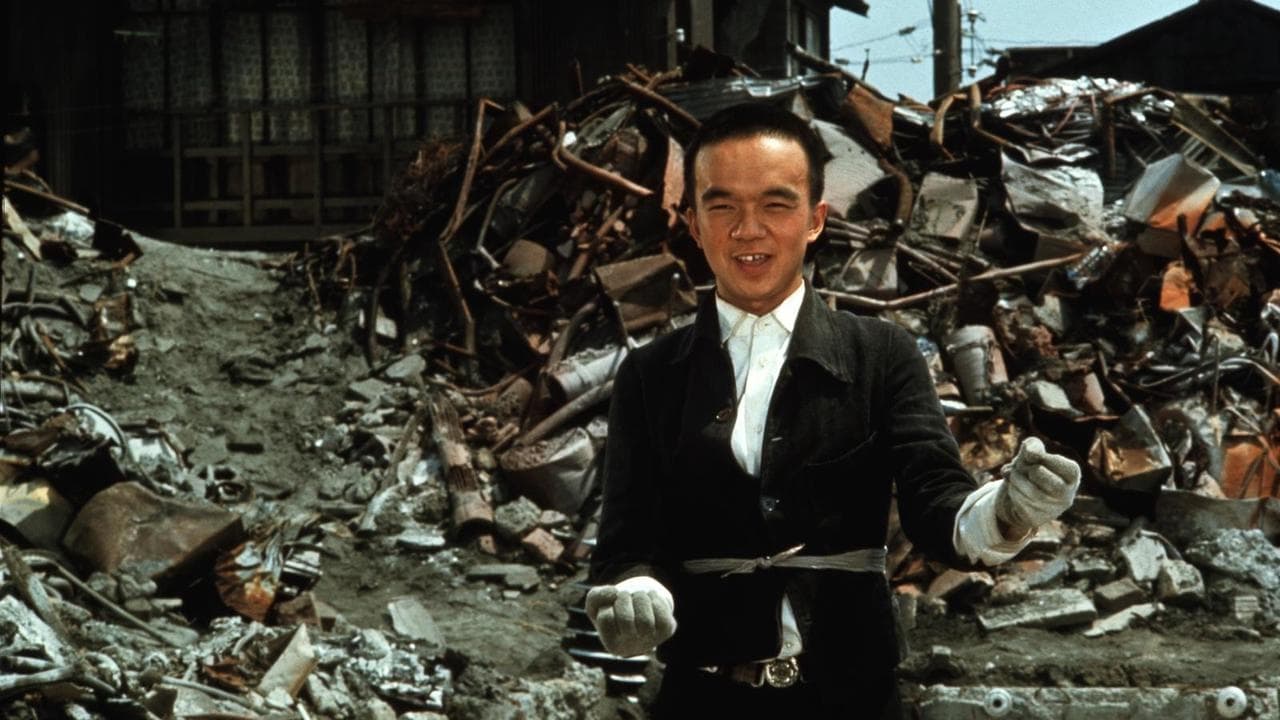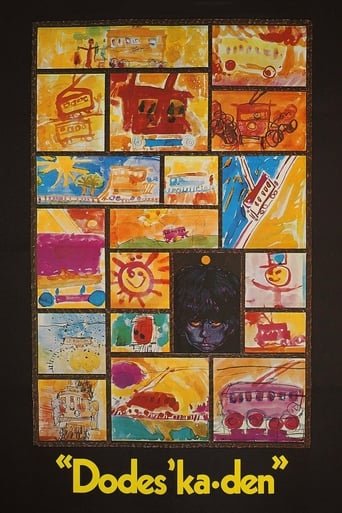

n my opinion it was a great movie with some interesting elements, even though having some plot holes and the ending probably was just too messy and crammed together, but still fun to watch and not your casual movie that is similar to all other ones.
... View MoreThe film was still a fun one that will make you laugh and have you leaving the theater feeling like you just stole something valuable and got away with it.
... View MoreA movie that not only functions as a solid scarefest but a razor-sharp satire.
... View MoreJust intense enough to provide a much-needed diversion, just lightweight enough to make you forget about it soon after it’s over. It’s not exactly “good,” per se, but it does what it sets out to do in terms of putting us on edge, which makes it … successful?
... View MoreVarious characters live in a rubbish slum village. Dim-witted Roku-chan lives with his mother and pretends to drive a streetcar. There is the elderly Mr. Tamba. Shima has his ticks and a combative wife. Katsuko lives with her mean-spirited drunken uncle while her aunt is in the hospital. There is always a gaggle of women at the communal water spigot. Some in the settlement struggle to make ends meet while others drink their lives away.This is Akira Kurosawa's first colored film and he's using a kaleidoscope of colors. It's a rambling piece going from one character to the next without much connective flow. These are little vignettes of life. They are mostly unreal. Some are compelling and some are funny. Far too many ramble on and on. Without a plot or much drama, watching this becomes mostly an exercise in Kurosawa fandom.
... View MoreLet me start by saying I am a big fan of Japanese cinema generally and of Kurosawa specifically. I've seen many of Kurosawa's movies but for quite some time I resisted Dodes'ka-den. Based on the first half of the movie, my hesitancy about seeing it was well founded. I cannot comment on the whole movie because I became intensely frustrated and walked out around the midpoint.Dodes'ka-den shows people living in a junkyard somewhere in Japan. The characters are all very broadly drawn with no nuance in their portrayal. In other words, they are almost pure types: There are the two laborers who get drunk every night to the dismay of their slatternly wives; the urchin living in a car with his architecture-obsessed lunatic guardian; the nasty drunk and his semi-catatonic daughter who makes artificial flowers 20 hours a day; the aggressive nut job who picks fights; the catatonic nut job who likes ripping fabric into strips; the obsessive brush-maker and his slutty wife; the teenager who thinks he's a trolley driver and his highly religious mother....All of these people are hopeless misfits and outcasts; they display their various pathologies and vices ad nauseum during the film, and it wears thin pretty damned quickly...There is no plot; rather, the film consists of a series of vignettes of the characters being weird and/or nasty either on their own or in various combinations. The scenes alternate regularly from one person to the next and so the time passes slowly onwards. Realism isn't the point here, and there isn't a hint of narrative -- it is a fantasy, but to what purpose? The antics of the characters seem forced, mannered, repetitive and flat. There is no discernible social critique or message. I felt the movie was nearly a complete waste, much like the lives of the people it portrays.Again, these impressions are just from the first half of Dodes'ka-den. Perhaps something happens later that rewards the endurance (or passivity) of the hapless viewer who sticks around to see how it all ends up. I felt only the vaguest stirrings of curiosity about the ending as I raced out of the theater.If you are really patient or undemanding, or someone who wants to see absolutely every Kurosawa film, you might consider seeing Dodes'ka-den. But for those of you who have feasted on Kurosawa's earlier, better-known movies this title is likely to be a severe disappointment.
... View MoreMost people, when they think of expressionist cinema, look to the b&w German films of the silent and early sound eras--films that emphasized canted angles, extreme contrasts of light and dark, exaggerated performance, and occasional uses of surrealism to create a dreamlike atmosphere in order to diverge from traditional, naturalistic modes of cinematic representation. If we're willing to accept that the Germans were not the only filmmakers to create expressionist cinema (and that those above-mentioned characteristics are not prerequisites for expressionist film), then I would argue that Dodes'ka-den (DKD) is a prime example of this type of film. Like Dreams, DKD is a little unhinged for a Kurosawa film, dabbling, as it does, in the unreal. However, DKD is also, unlike Dreams, a great film and probably my favorite Kurosawa picture. Why? Mostly, I think, it's the colors. This was, I believe, Kurosawa's first color film, and the man saturates the movie with vibrant primary colors, creating a completely unreal contemporary Japan. We are used to the neon lights and gleaming Tokyo skyscrapers; we are not used to a city that appears to have been colored with crayons. DKD is, as I said, a peculiar film inasmuch as many of its characters live in a junkyard, appearing to live in an alternate universe. That is, I think, the point--these are the Tokyo outsiders, the people left behind during the great move forward following World War II. The film also represents one of Kurosawa's more heartfelt movies; there is genuine sentiment here and genuine pathos (such as when the boy's father describes their dream home). It's an amazingly moving film from a man better known for stunning, John Ford-like vistas and samurais. Everyone should have known Kurosawa had in him a movie as touching and thought provoking as this (Ikiru foreshadows the emotional resonance of this film in many ways). I will also argue, to the last, that this is Kurosawa's greatest achievement. His samurai films, though capable pictures, pale in comparison to works by Kobayashi (Hara-kiri is the greatest, most intelligent samurai film committed to celluloid). Rashomon, Hidden Fortress, Seven Samurai, Yojimbo, Sanjuro, Kagemusha, and Ran are all fine films, but they're merely good (and, frankly, I think that word is too generous for Hidden Fortress and Kagemusha). DKD is a great movie, as is Ikiru. They are the crown jewels that show Akira was not a one-trick samurai pony. They reveal his artistry and mastery of cinema.
... View MoreAnother demonstration of Kurosawa's genius, his first colour film is a darkly surreal look into the tragic lives of Tokyo slum dwellers, essentially a series of interweaving vignettes depicting several groups of people eking out a perilous existence in a harsh and uncaring post-war shanty town. Swinging from comedy to tragedy and back, this film shows how people deal with the worst kind of life each in their own way, mostly retreating into themselves and living in the fantasy worlds of their own heads, withdrawing emotionally from those around them or drowning themselves in alcohol. Mixing kitchen-sink realism with Kabuki-esque theatrics, Kurosawa toys expertly with the emotions of his audience, drawing tears and laughter with equal deftness. A wonderful, draining experience.
... View More